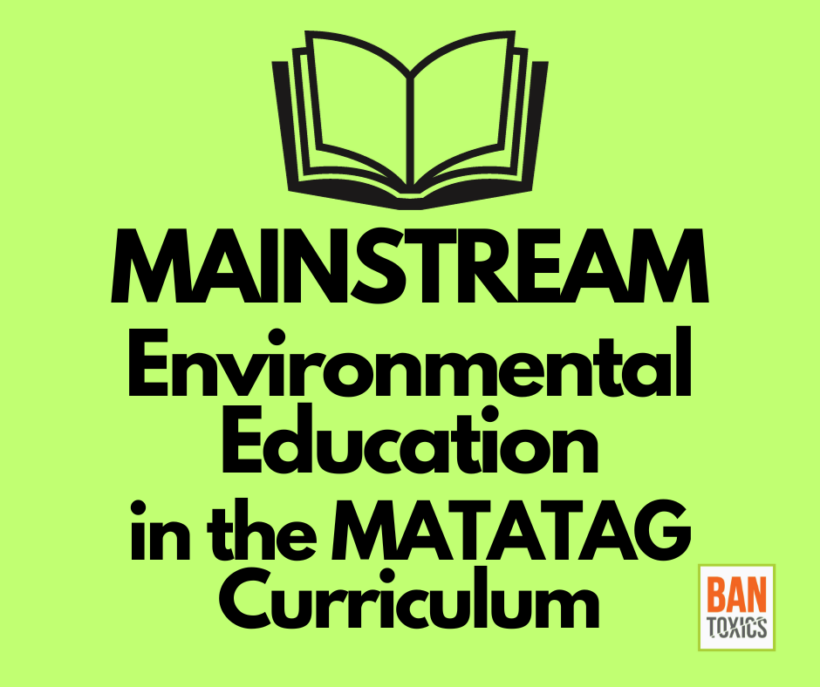As VP and DepEd Secretary Sara Duterte and the Department of Education (DepEd) brace the country for an enhanced basic education program dubbed MATATAG, environmental group BAN Toxics urges the government to “include and seriously consider environmental education as a core curriculum component in this initiative.
Citing information from the Department of Education Order No. 13, s 2023, the MATATAG agenda has four critical components:
MAke the curriculum relevant to produce competent and job-ready, active, and responsible citizens;
TAke steps to accelerate the delivery of basic education facilities and services;
TAke good care of learners by promoting learner well-being, inclusive education, and a positive learning environment; and,
Give support to teachers to teach better.
“As DepEd sees the need to revise the basic education curriculum recognizing structural challenges burdening our education system, real and meaningful reforms in the education system need to be holistic. DepEd must take into account our planet’s critical investments if we are to build a stronger nation,” said Rey San Juan, Executive Director of BAN Toxics.
“As MATATAG seeks to revise the K-12 curriculum, we call on DepEd to incorporate environmental education to produce responsible young people who learn and act for our planet,” he added.
A study by UNESCO reveals that education is not giving students sufficient knowledge to adapt, act, and respond to climate change and environmental crises.
“The country faces serious environmental challenges disproportionately impacting the poor and vulnerable. Let us educate and build the ability of our young ones and future generations to become environmentally resilient, better able to cope with the impact, and meet their own needs.”
BAN Toxics has been ramping up its campaign Toxics-Free and Waste-Free School Program (TFSP) to raise awareness of toxic pollution in schools. The TFSP aims to promote safe and environment-friendly alternatives and engages schools and communities on proper sound chemicals and waste management.
The group partnered with schools both public and private to help develop school programs and policies that focus on the health, environment, and human rights impacts of chemicals and wastes among students and teachers.
“Through the TFSP, BAN Toxics hopes to cultivate future change makers who will advocate for a safer future where chemicals and wastes are managed and used sustainably,” the group added.
“School administrators, teachers, parents, students, and communities will be the stakeholders of the program, which includes conducting activities for environmental awareness, promoting eco-friendly and non-toxic alternatives that are safer for the environment, and ensuring health and safety through the development and implementation of green programs and policies,” the group lamented.
TFSP also focused on the development of solutions for proper chemicals and waste management through research, training activities, and module/curriculum development processes.
Echoing UNESCO’s rallying call, “education should equip learners to comprehend the planetary crisis and act to save our planet. We must start our children to shift lifestyles, consumption patterns, and ecological interactions. Incorporating environmental education should be ingrained across education curricula as a fundamental principle.”
BAN Toxics is an independent non-government environmental organization that works for the advancement of environmental justice, health, chemical safety, and sound management of chemicals and wastes in schools, homes, and communities, with a special focus on women, children, and other marginalized sectors. #
References:
DO_s2023_013.pdf (deped.gov.ph)
https://www.deped.gov.ph/2023/01/30/matatag-depeds-new-agenda-to-resolve-basic-education-woes/
UNESCO, 2021. UNESCO urges making environmental education a core curriculum component in all countries by 2025. Accessed from: https://www.unesco.org/en/articles/unesco-urges-making-environmental-education-core-curriculum-component-all-countries-2025
https://www.fda.gov.ph/fda-advisory-no-2021-0879-ban-of-silver-jewelry-cleaners-containing-cyanide/






